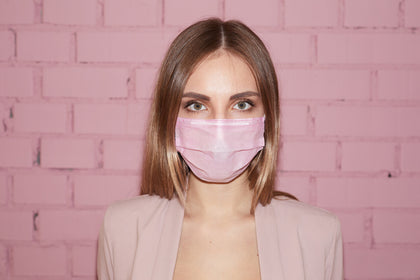It’s no secret that stress causes hair loss. And COVID-19 has caused a lot of stress. So, what's the connection between COVID and hair loss? While the research has just begun, doctors are seeing an increase in hair loss patients during the pandemic, including patients who have been diagnosed with the COVID-19 virus and healthy patients who are experiencing emotional stress. But not to worry — there are many ways to recover from hair loss during the coronavirus pandemic and promote hair wellness.
#include-related-slider#
Does Having COVID-19 Cause Hair Loss?
The short answer is: sometimes. If you are recovering from coronavirus, you might experience persistent symptoms like hair loss after COVID.
In one study, which focuses on COVID patients over 100 days after hospital admission, 20% reported increased hair loss. In another, 154 out of 538 survivors — nearly 29% — reported having alopecia, a condition where small patches of hair fall out due to the immune system attacking hair follicles. Notably, an overwhelming majority (142) of these patients were women.
Although there is not yet evidence that COVID-19 directly causes hair loss, observational studies suggest telogen effluvium — aka TE — is occurring in COVID-19 survivors. Researchers and doctors name inflammation and the stress of sudden illness among possible causes. In these cases, hair shedding begins about three months after the patient shows COVID symptoms.
Read: Everything You Should Know About Stress and Hair Loss
What Is Telogen Effluvium?
You may have heard of TE, but what is it exactly? The condition results from a shock to the body, like psychological stress, high fever or illness. Since the Centers for Disease Control and Prevention lists fever as a common symptom of COVID-19, TE is a likely culprit for COVID hair loss.
If you are recovering from COVID-19 and notice more hair than normal falling out (for example, appearing on furniture, falling on your arms, accumulating on your pillowcase or in your brush or coming out in the shower), you might be experiencing telogen effluvium.
In a healthy hair growth cycle, between 85%-90% of your hairs are in the anagen (or growth) phase. After the anagen phase is complete, the hairs transition to the telogen (or resting) phase. So, about 10%-15% of your hairs should be in the resting phase at any given time. Naturally, hairs stay at rest for about three months before the shedding phase begins.
When a person experiences a shock to the body that causes telogen effluvium, more hairs than normal enter the telogen phase — 30% on average and up to 50%. Then, about three months later, all of that hair starts shedding.
The good news about TE is that shedding rarely lasts longer than six months. And a new hair starts growing behind each one that enters the telogen phase. So, in most cases, thinner hair should return to fullness within nine to 12 months. To improve density in the meantime, consider adding GRO Hair Serum to your wellness routine. After all, we could all use a little pick-me-up after the coronavirus pandemic.
Find Out: 6 Times You May Need to See a Trichologist
Hair Loss Due to Emotional Stress During the Pandemic
So you've stayed in good health during the pandemic (bravo!) but haven't escaped the COVID-19 hair loss phenomenon. You're not alone. According to Dr. Tsippora Shainhouse, M.D., FAAD, of SkinSafe Dermatology, "Dermatologists have been noticing a huge surge in patients presenting with new-onset, significant hair shedding that began in June, about three months after the sudden, mandated quarantine began." She cautions that quarantine-associated stresses can trigger TE even without the presence of infection. For example, any of these factors can cause enough stress to halt the hair growth cycle:
- Change in routine
- Concern about getting sick
- Challenges of remote work and school
- Job loss
- Uncertainty about how to pay bills or get food
- Physical separation from friends and family
If you are experiencing hair loss during the pandemic, consult a dermatologist. With a professional, you can address the cause of your symptoms and also determine if you're suffering from a different hair loss condition.
Find Out: How Much Hair Loss Is "Normal"?
How To Prevent Hair Loss
Whether you're recovering from coronavirus or simply trying to reduce your stress level during the pandemic, try these tips that promote hair wellness.
1. Eat a Healthy Diet
Make sure you're getting all the nutrients you need to grow gorgeous hair and feel well. Foods with protein and biotin aid keratin production and growth, while zinc maintains a healthy scalp. Our GRO Biotin Gummies are an easy and delicious way to get the added nutrients you need to create thicker, shinier hair.
Also: 7 Reasons to Take Hair Supplements
2. Check Up On Your Health
While they may not cause hair loss, underlying medical conditions like iron deficiency, low vitamin D levels and thyroid disease can all prevent regrowth. Visit your doctor to rule out these conditions and give your hair its best chance to grow back.
Shop: Compare GRO vs GRO+ Advanced
3. Take Time for Self-Care
Limit stressors and reduce anxiety with a daily routine. Start with these easy tips:
- Get enough sleep; aim for eight hours a night.
- Stick to a schedule to create a sense of order and purpose in your day.
- Practice deep breathing or meditation. Consider a meditation app if you're a beginner.
- Pamper yourself. Try a relaxing scalp massage — warm baths encouraged.
- Find a creative outlet by getting fresh air, reading, watching uplifting shows, coloring, gardening or journaling.
- Stay connected with friends and family with virtual meetups for clubs, games or morning rituals.
4. Give Your Strands a Rest
Heat styling and tight updos can be flattering, but they also put a lot of stress on your locks. Try giving your hair some time off from heavy styling. Brush gently to avoid tugging on strands, and if you want to pull back hair without harming it, try using gentle hair ties that go easy on your mane.
5. See a Dermatologist
If you have extreme or rapid hair shedding, contact the staff at a dermatologist's office to make an appointment. Or, for even more specialized help, visit a trichologist who specializes in conditions of the hair and scalp.
Also: How to Exfoliate Your Scalp for Healthier Hair
Focus on Growth
No matter what you're facing during the pandemic, remember to take care of yourself in the process. Whether you're experiencing hair loss due to illness or stress, there are many ways to take control and return to a growth phase — both for your hair and in your daily life. With these tips and a holistic approach to hair health, you can start looking and feeling your best again.
More From VEGAMOUR
- Does the Keto Diet Cause Hair Loss? Causes and Tips for Growth
- How to Detangle Hair With Minimal Damage
- Here's How Often You Should Cut Your Hair
- What Causes Female Hair Loss at the Temples?
Photo credit: SeventyFour/iStock
Back


















